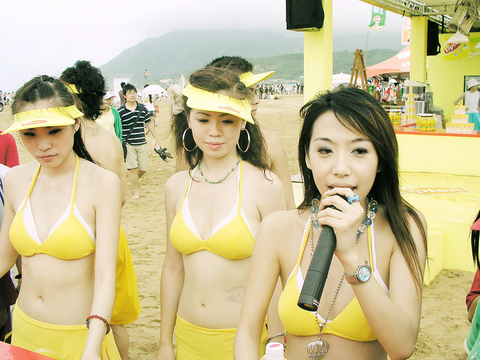First it was going to happen, and then it wasn't going to happen until later, then it did happen for a bit, and now it's canceled -- but only for now. The annual Ho-Hai-Yan beachside brouhaha (海洋音樂祭2005) got off to a start at Fulong (福隆) on Wednesday, two weeks after the original scheduled date and despite a host of problems, the last of which was a thundershower, the precursor of another typhoon.
Organizers were forced to cancel performances for last night and tonight. And as of press time last night, the official word was "wait and see" about shows scheduled for tomorrow and Sunday.
At least a fortunate few made it out on Wednesday for some five hours of live music that was originally supposed to last five days. A late afternoon rainstorm threatened to have the modest crowd head for home, but by 6pm, the rain had subsided, the bands had plugged in and the beach was booming.

PHOTO: TAIPEI TIMES
The beach itself figured prominently in the proceedings even before the party began. Long Taipei County's most popular beach, Fulong has in recent years been the site of substantial development built to accommodate weekend crowds. The scene here changed last year when the beach disappeared as a result of tidal changes caused by the construction of a wharf to service the Fourth Nuclear Power Plant.
When organizers began planning this year's Fulong festival, there wasn't much of a beach on which to put it. Indeed, the bridge that is the site's centerpiece led out to open water only weeks ago, according to organizers.
But any thought Wednesday night's partygoers might have had of wading out to the man-made peninsula was cut short at the tape lining the water's edge and by the guards standing sentry to prevent any would-be wading.
One concertgoer said that police were being overzealous and mentioned another beach party she attended at Baishawan two weeks ago, where police had also cordoned off the water.
"I don't understand the point of having [concerts and parties] at the beach if the police won't let you even get your feet wet," she said.
Later a voice announced that MC Hotdog was about to play and partygoers stopped messing about in the sand and sidled up to the front of the Big Blue stage.
Anyone who wasn't on their feet for his first number was for his second, I Love Taiwanese Girls (
"Why isn't Da Zhi more popular than MC Hotdog?" was one comment overheard. "He's so cool."
"He's so song!" was her friend's answer. Maybe a bit too "crude."
That's never stopped a hip-hop artist before.
Back on the main beach, a laundry list of smaller-name bands did their best to battle against the cacophony of sound coming from the main stage. With only their friends and family to block the noise, it was a losing battle.
Despite the first typhoon that postponed the festival, most of the international headliners were still able to play on the new dates. Only Canadian rapper Peaches had to bow out. Organizers made no mention of again rescheduling international acts, including Vincent Gallo, Melissa auf der Maur, Japan's Boom Boom Satellites, Baseball from Australia and Black Rebel Motorcycle Club from the US.
Visit http://hohaiyan.com/2005.htm for the latest on cancellations and rescheduling.

On April 26, The Lancet published a letter from two doctors at Taichung-based China Medical University Hospital (CMUH) warning that “Taiwan’s Health Care System is on the Brink of Collapse.” The authors said that “Years of policy inaction and mismanagement of resources have led to the National Health Insurance system operating under unsustainable conditions.” The pushback was immediate. Errors in the paper were quickly identified and publicized, to discredit the authors (the hospital apologized). CNA reported that CMUH said the letter described Taiwan in 2021 as having 62 nurses per 10,000 people, when the correct number was 78 nurses per 10,000

As we live longer, our risk of cognitive impairment is increasing. How can we delay the onset of symptoms? Do we have to give up every indulgence or can small changes make a difference? We asked neurologists for tips on how to keep our brains healthy for life. TAKE CARE OF YOUR HEALTH “All of the sensible things that apply to bodily health apply to brain health,” says Suzanne O’Sullivan, a consultant in neurology at the National Hospital for Neurology and Neurosurgery in London, and the author of The Age of Diagnosis. “When you’re 20, you can get away with absolute

May 5 to May 11 What started out as friction between Taiwanese students at Taichung First High School and a Japanese head cook escalated dramatically over the first two weeks of May 1927. It began on April 30 when the cook’s wife knew that lotus starch used in that night’s dinner had rat feces in it, but failed to inform staff until the meal was already prepared. The students believed that her silence was intentional, and filed a complaint. The school’s Japanese administrators sided with the cook’s family, dismissing the students as troublemakers and clamping down on their freedoms — with

As Donald Trump’s executive order in March led to the shuttering of Voice of America (VOA) — the global broadcaster whose roots date back to the fight against Nazi propaganda — he quickly attracted support from figures not used to aligning themselves with any US administration. Trump had ordered the US Agency for Global Media, the federal agency that funds VOA and other groups promoting independent journalism overseas, to be “eliminated to the maximum extent consistent with applicable law.” The decision suddenly halted programming in 49 languages to more than 425 million people. In Moscow, Margarita Simonyan, the hardline editor-in-chief of the